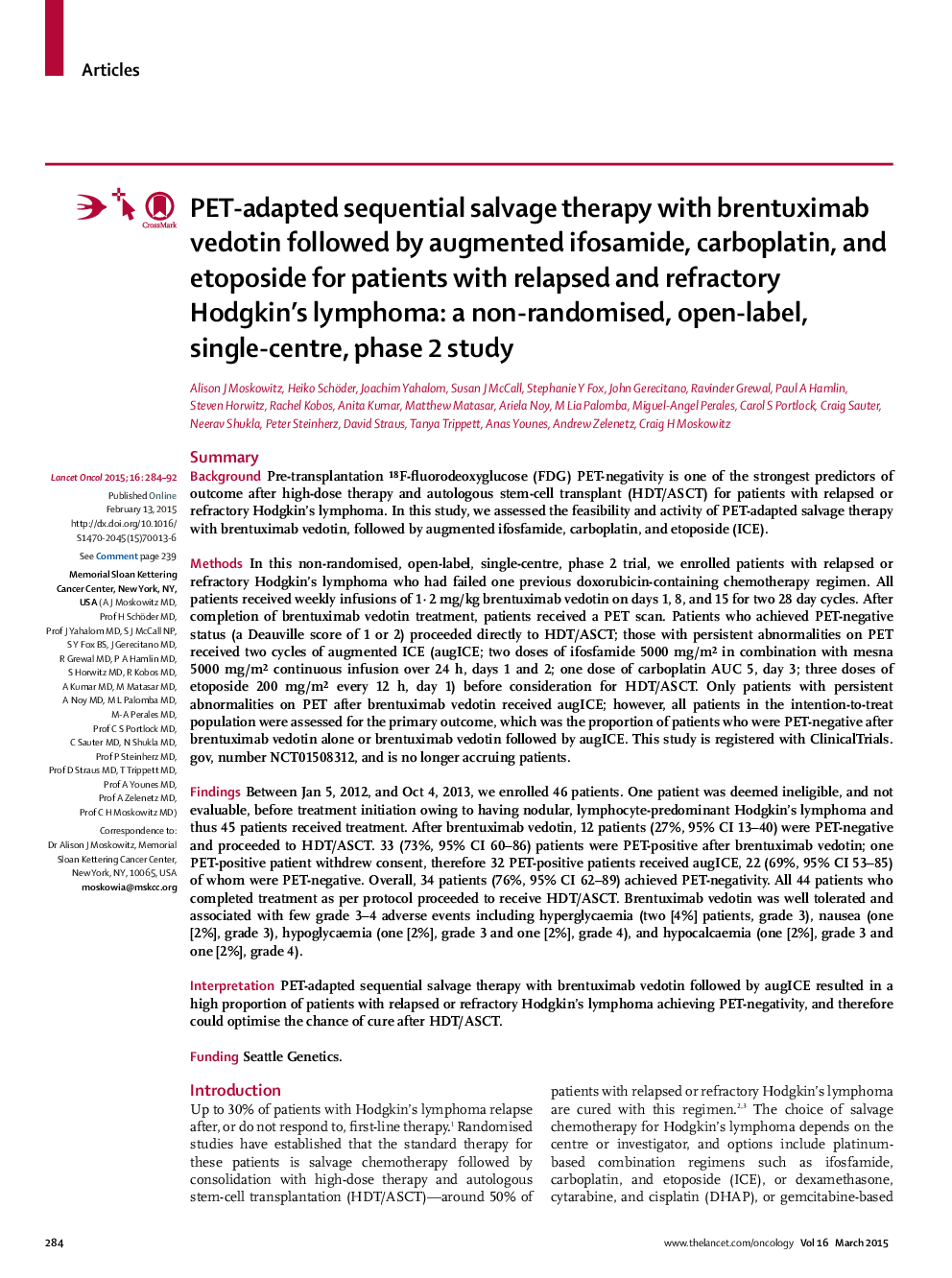| Article ID | Journal | Published Year | Pages | File Type |
|---|---|---|---|---|
| 3993693 | The Lancet Oncology | 2015 | 9 Pages |
SummaryBackgroundPre-transplantation 18F-fluorodeoxyglucose (FDG) PET-negativity is one of the strongest predictors of outcome after high-dose therapy and autologous stem-cell transplant (HDT/ASCT) for patients with relapsed or refractory Hodgkin's lymphoma. In this study, we assessed the feasibility and activity of PET-adapted salvage therapy with brentuximab vedotin, followed by augmented ifosfamide, carboplatin, and etoposide (ICE).MethodsIn this non-randomised, open-label, single-centre, phase 2 trial, we enrolled patients with relapsed or refractory Hodgkin's lymphoma who had failed one previous doxorubicin-containing chemotherapy regimen. All patients received weekly infusions of 1·2 mg/kg brentuximab vedotin on days 1, 8, and 15 for two 28 day cycles. After completion of brentuximab vedotin treatment, patients received a PET scan. Patients who achieved PET-negative status (a Deauville score of 1 or 2) proceeded directly to HDT/ASCT; those with persistent abnormalities on PET received two cycles of augmented ICE (augICE; two doses of ifosfamide 5000 mg/m2 in combination with mesna 5000 mg/m2 continuous infusion over 24 h, days 1 and 2; one dose of carboplatin AUC 5, day 3; three doses of etoposide 200 mg/m2 every 12 h, day 1) before consideration for HDT/ASCT. Only patients with persistent abnormalities on PET after brentuximab vedotin received augICE; however, all patients in the intention-to-treat population were assessed for the primary outcome, which was the proportion of patients who were PET-negative after brentuximab vedotin alone or brentuximab vedotin followed by augICE. This study is registered with ClinicalTrials.gov, number NCT01508312, and is no longer accruing patients.FindingsBetween Jan 5, 2012, and Oct 4, 2013, we enrolled 46 patients. One patient was deemed ineligible, and not evaluable, before treatment initiation owing to having nodular, lymphocyte-predominant Hodgkin's lymphoma and thus 45 patients received treatment. After brentuximab vedotin, 12 patients (27%, 95% CI 13–40) were PET-negative and proceeded to HDT/ASCT. 33 (73%, 95% CI 60–86) patients were PET-positive after brentuximab vedotin; one PET-positive patient withdrew consent, therefore 32 PET-positive patients received augICE, 22 (69%, 95% CI 53–85) of whom were PET-negative. Overall, 34 patients (76%, 95% CI 62–89) achieved PET-negativity. All 44 patients who completed treatment as per protocol proceeded to receive HDT/ASCT. Brentuximab vedotin was well tolerated and associated with few grade 3–4 adverse events including hyperglycaemia (two [4%] patients, grade 3), nausea (one [2%], grade 3), hypoglycaemia (one [2%], grade 3 and one [2%], grade 4), and hypocalcaemia (one [2%], grade 3 and one [2%], grade 4).InterpretationPET-adapted sequential salvage therapy with brentuximab vedotin followed by augICE resulted in a high proportion of patients with relapsed or refractory Hodgkin's lymphoma achieving PET-negativity, and therefore could optimise the chance of cure after HDT/ASCT.FundingSeattle Genetics.
